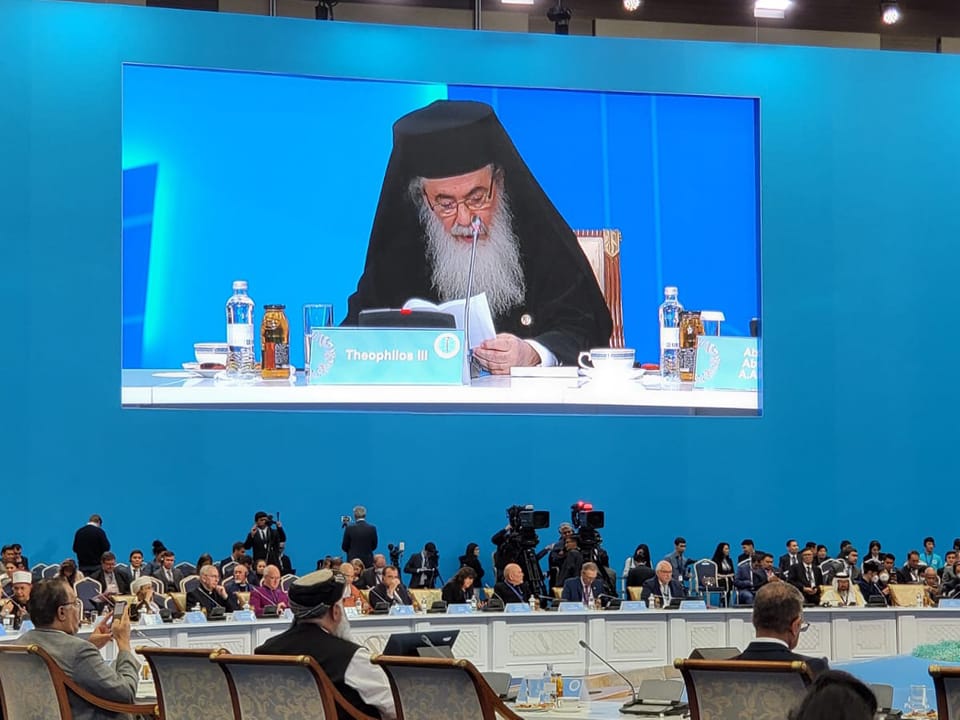Joaquim Magalhães de Castro
On the 17th and 18th of this month, Kazakhstan will once again host the Congress of Leaders of World and Traditional Religions. The event, now in its eighth year and bringing together representatives of all faiths, will once again be held in Astana, with the Apostolic Nunciature organizing the event.
This global interfaith forum is expected to bring together more than 100 delegations from approximately 60 countries, including important spiritual leaders from Islam, Christianity, Buddhism, Judaism, Hinduism, Taoism, Zoroastrianism, and Shintoism, as well as representatives of international organizations, academics, and public figures. Notable participants include Patriarch Kirill of Moscow and the Grand Imam of Al-Azhar, Sheikh Ahmed el-Tayeb. The inaugural session will take place on the evening of September 16th and will be chaired by Senate President Maulen Ashimbayev, followed by a special session of the UN Alliance of Civilizations on the theme: “The Protection of Religious Sites.” The plenary session on September 17th will focus on the theme “Dialogue of Religions: Synergy for the Future,” followed by several discussions on the many global challenges. The event will conclude the following day with the Second Forum of Young Religious Leaders, focused on “youth engagement in promoting peaceful coexistence.”
The congress was the main topic of a recent conversation between Kazakhstan’s Deputy Foreign Minister, Arman Isetov, and the Apostolic Nuncio to Kazakhstan, Archbishop George Panamtundil. As the Ministry of Foreign Affairs of that Central Asian country emphasized, this meeting “once again confirms the cordial and fruitful nature of relations between Kazakhstan and the Holy See, based on mutual respect, trust, and the desire for constructive dialogue.”
According to the Kazakh government spokesperson, the Congress, as an international forum, “has already become a platform where the Church, together with representatives of various religious denominations from around the world, bears witness to the value of peace, mutual understanding, and harmony.” Therefore, local authorities have already expressed their gratitude to the Holy See “for its continued and active participation in the life of the Congress.” During the meeting, the Nuncio and the Minister also discussed the various cooperation agreements Kazakhstan has signed with institutions affiliated with the Holy See in the areas of education and science, and highlighted “the success of the projects between the R.B. Suleimenov Institute of Oriental Studies and the Vatican Apostolic Library and Archives, an important testament to the fact that the study and preservation of spiritual heritage unites scholars and believers on both sides.” The discussions also addressed collaboration with the Bambino Gesù Children’s Hospital in Rome, a clinical center where “joint projects in the field of pediatric neurology and epileptology”—the branch of medicine that treats epilepsy and its complications—will be developed.
The firts edition of the Congress of Leaders of World and Traditional Religions took place in September 2003, in Astana, at the initiative of the first President of the Republic of Kazakhstan, Nursultan Abishevich Nazarbayev. In his speech on February 13 of that same year, during the International Conference on Peace and Concord – which would play an important role in bringing religions, cultures, and peoples closer together, and which included representatives of Christian, Muslim, and Jewish organizations – the Kazakh leader asked representatives of all religions to support his idea of holding the Congress of World Leaders and Traditional Religions in his country. Representatives of the Catholic Church were among the first to support the initiative and made this commitment during the Kazakh president’s visit to the Vatican.
The search for common human milestones in world and traditional religions and the effective functioning of “a permanent international interreligious institution for interreligious dialogue and the adoption of agreed decisions” were and are the motto of the congress, whose priorities we now enumerate: the establishment of peace, harmony, and tolerance as unshakable principles of human existence; the struggle for mutual respect and tolerance among religions, denominations, nations, and ethnic groups; prevent the exploitation of people’s religious feelings to escalate conflicts and hostilities. Therefore, the following are unwavering objectives: strengthening the traditions of interreligious and interfaith dialogue in the form of interreligious congresses; creating a permanent congressional body for “the coordinated, objective, and competent preparation of the ideology and concept of future congresses”; cooperating and interacting with all international organizations and structures designed to promote dialogue between religions, cultures, and civilizations; expanding dialogue between representatives of different cultures and religions with the involvement of representatives of secular and religious media, youth associations, scientists, and contemporary creatives; deepening and strengthening mutual understanding and respect among religious communities as a counterbalance to the ideology of hatred and extremism; preventing the prevalence of theses about the “clash of civilizations,” expressed in the opposition of religions and the increased politicization of theological disputes, as well as attempts to discredit one religion at the expense of another; finally, striving to promote global dialogue between civilizations, cultures, and religions.
It is worth remembering that the 7th Congress of Leaders of World and Traditional Religions took place during Pope Francis’ apostolic visit to Kazakhstan in September 2022, with the Holy Father addressing the participants gathered in the country’s capital.


 Follow
Follow


